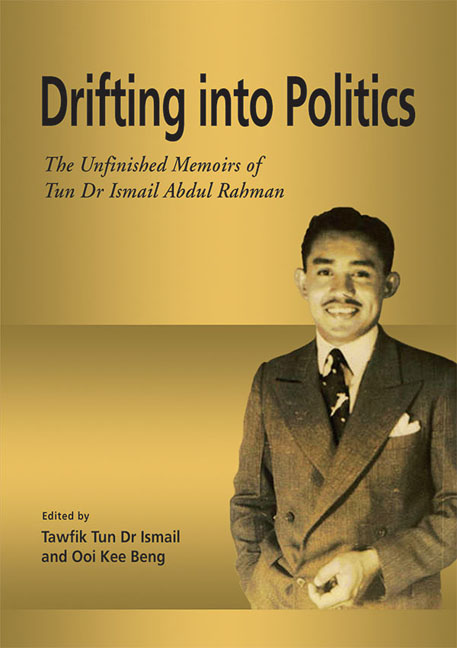Book contents
- Frontmatter
- Contents
- Preface
- INTRODUCTION
- CHRONOLOGY of Tun Dr Ismail bin Datuk Haji Abdul Rahman's Life (From The Reluctant Politician)
- REVIEW of The Reluctant Politician: Tun Dr Ismail and His Time (From Journal of the Malaysian Branch of the Royal Asiatic Society)
- Drifting into Politics: The Unfinished Memoirs of Tun Dr Ismail Abdul Rahman
- Chapter One
- Chapter Two
- Chapter Three
- Chapter Four
- Chapter Five
- Chapter Six
- Chapter Seven
- Chapter Eight
- Chapter Nine
- Chapter Ten
- Chapter Eleven
- Chapter Twelve
- Chapter Thirteen
- Chapter Fourteen
- Chapter Fifteen
- Chapter Sixteen
- Further Notes (30 March 1970)
- Further Notes (26 October 1972)
- Index
- About the Editors
Chapter Sixteen
from Drifting into Politics: The Unfinished Memoirs of Tun Dr Ismail Abdul Rahman
Published online by Cambridge University Press: 19 May 2017
- Frontmatter
- Contents
- Preface
- INTRODUCTION
- CHRONOLOGY of Tun Dr Ismail bin Datuk Haji Abdul Rahman's Life (From The Reluctant Politician)
- REVIEW of The Reluctant Politician: Tun Dr Ismail and His Time (From Journal of the Malaysian Branch of the Royal Asiatic Society)
- Drifting into Politics: The Unfinished Memoirs of Tun Dr Ismail Abdul Rahman
- Chapter One
- Chapter Two
- Chapter Three
- Chapter Four
- Chapter Five
- Chapter Six
- Chapter Seven
- Chapter Eight
- Chapter Nine
- Chapter Ten
- Chapter Eleven
- Chapter Twelve
- Chapter Thirteen
- Chapter Fourteen
- Chapter Fifteen
- Chapter Sixteen
- Further Notes (30 March 1970)
- Further Notes (26 October 1972)
- Index
- About the Editors
Summary
While I agreed to the notion that Malaysia should be formed by the Association of Malaysia, Singapore, Sabah, and Sarawak, I had many reservations about the way it was formed and the conditions which Singapore, Sabah, and Sarawak imposed for joining the new Federation. As Minister of Home Affairs, I objected to giving Sabah and Sarawak the control of immigration between themselves on one side and Malaya and Singapore on the other. I also opposed the Tunku's generous offer of forty seats in the Federal Parliament. It is true that I did not oppose it so strongly to the extent of resigning from the Cabinet. I am not trying to disclaim my part in the collective responsibility of Cabinet, which approved the formation of Malaysia. I write it down to show how my convictions in politics have changed since the days when we fought for independence and since the early days after independence. During that period, I was uncompromising in what I believed in. I had no strong convictions about how and under what conditions Singapore should join Malaysia. I felt that the only way Singapore could stay in Malaysia after joining it depended not so much on what was written in the constitution, but rather on how the two political parties, the Alliance and the PAP approached this new state of affairs. I was under the impression that the PAP was to govern Singapore to make it the “New York of Southeast Asia”, while the Alliance was to govern Malaysia and that the two would work closely together for the benefit of Malaysia as a whole. However, it was obvious that once Singapore was in Malaysia, the status quo which I hoped would continue was not possible. Personal jealousies and ambitions were so strong and the political approaches to communal problems were so divergent that either of two things was bound to happen: first, if Singapore continued to be a part of Malaysia, communal clashes of such a magnitude as to destroy Malaysia as an identity was bound to occur; second, if Singapore was separated by mutual agreement, the chances of cooperation and eventual union of the two countries was a certainty. As it turned out, the latter alternative happened. In spite of what was believed, the separation of Singapore from Malaysia was by mutual agreement.
- Type
- Chapter
- Information
- Drifting into PoliticsThe Unfinished Memoirs of Tun Dr Ismail Abdul Rahman, pp. 71 - 73Publisher: ISEAS–Yusof Ishak InstitutePrint publication year: 2015

